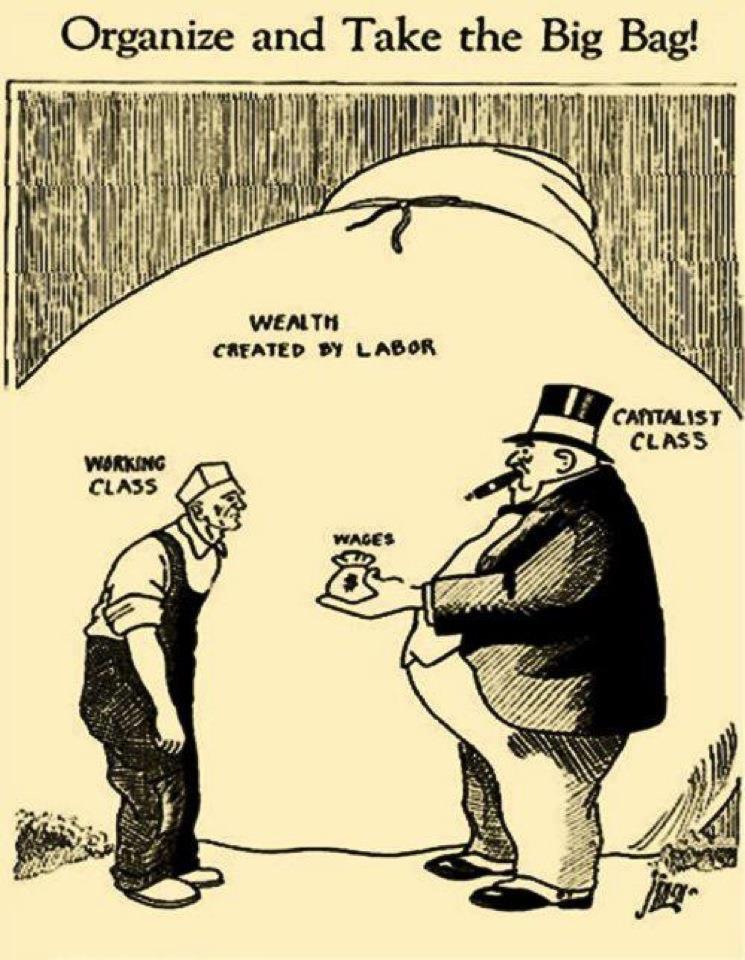Welcome to DU!
The truly grassroots left-of-center political community where regular people, not algorithms, drive the discussions and set the standards.
Join the community:
Create a free account
Support DU (and get rid of ads!):
Become a Star Member
Latest Breaking News
General Discussion
The DU Lounge
All Forums
Issue Forums
Culture Forums
Alliance Forums
Region Forums
Support Forums
Help & Search
General Discussion
Related: Editorials & Other Articles, Issue Forums, Alliance Forums, Region ForumsThe Big Bag: Labor, Labor Day and Corporate cause of income inequality.

U.S. corporations excel at getting more out of workers
One of the major economic forces of the past several decades has been the steady rise in productivity. Thanks to computers, better manufacturing processes and demands that everyone work harder and smarter, American companies are doing more with less.
Big U.S. companies, in particular, are squeezing plenty out of each worker. In fact, greater efficiency is one reason that many of these corporations have become so large and successful.
The 100 giant corporations in the Standard & Poor's 100 collectively employ 14.5 million people globally and thus exert a big impact on the world economy. The typical giant company could fill Chase Field three times with its workforce. Walmart Stores alone has a headcount of 2.2 million people, roughly the population of Houston.
But giant firms don't hire people wantonly. Indeed, restrained hiring by Corporate America has been a significant reason the economic recovery has been sluggish. Companies instead have become more efficient. A Labor Day analysis of America's 100 biggest corporations by The Arizona Republic shows that these firms average about $550,000 in revenue from each worker. That's one reason corporate profit and stock-market values of these companies have never been higher.
"Innovation and productivity have allowed us to elevate standards of living without inflation," said Jack Ablin, chief investment officer at BMO Private Bank. "The world has become more efficient."
But the flip side is that productivity disparities might be contributing to the widening wealth divide. Skilled employees at highly productive companies enjoy better pay, benefits and job security. Another, less obvious implication, is that owners — that is, stockholders — have reaped the gains from productivity at least as much, and perhaps more so, than workers have.
This helps to explain why the stock market is hovering at record highs at the same time that two in five Americans say they would have trouble coming up with $2,000 in a pinch, as one recent survey revealed.
"People who own shares have benefited more than people who get paychecks," Ablin said.
Crunching the numbers
In the study, The Republic calculated productivity by dividing annual revenue over the four most recent quarters by the number of corporate employees, as tracked by researcher Morningstar Inc., for those giant firms in the S&P 100 index.
much more in this link naming companies etc.
http://www.azcentral.com/story/money/business/2014/08/30/us-companies-productivity-rise/14891835/
InfoView thread info, including edit history
TrashPut this thread in your Trash Can (My DU » Trash Can)
BookmarkAdd this thread to your Bookmarks (My DU » Bookmarks)
3 replies, 1058 views
ShareGet links to this post and/or share on social media
AlertAlert this post for a rule violation
PowersThere are no powers you can use on this post
EditCannot edit other people's posts
ReplyReply to this post
EditCannot edit other people's posts
Rec (18)
ReplyReply to this post
3 replies
 = new reply since forum marked as read
Highlight:
NoneDon't highlight anything
5 newestHighlight 5 most recent replies
= new reply since forum marked as read
Highlight:
NoneDon't highlight anything
5 newestHighlight 5 most recent replies
The Big Bag: Labor, Labor Day and Corporate cause of income inequality. (Original Post)
Ichingcarpenter
Sep 2014
OP
toby jo
(1,269 posts)1. I'd like to see them add smaller businesses to this study.
Large corporations can maximize wealth by the simple metrics of their buying power.
A better platform for action could be realized by pooling the numbers across the board, not just at the extreme high. I think we'd see a more subtle theft of wages that needs to be addressed.
Martin Eden
(12,847 posts)2. This is not the future that was supposed to be.
I grew up in the 1960's. The vision of the future back then was that new technologies and increased efficiency would translate into a higher standard of living for the average American with fewer hours worked and more quality time for life's other pursuits.
Instead, the benefits of almost all that progress has gone to the ownership class, private equity investors, and vulture capitalists.
I guess some things never change.
Laelth
(32,017 posts)3. k&r for labor. n/t
-Laelth